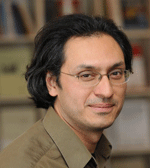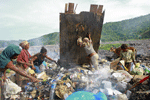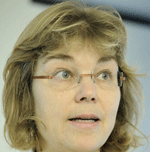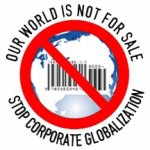Social Watch news
Published on Thu, 2011-11-17 08:36

Nicole Werner
(Photo: Alliance Sud)
|
Yet another UN climate conference will take place at the end of November in Durban, South Africa. It is the last chance to seamlessly replace the Kyoto Protocol – which expires in 2012 – with a follow-up protocol, warned Nicole Werner, expert on environment and climate of Alliance Sud, focal point of Social Watch in Switzerland.
|
Published on Wed, 2011-11-16 09:27
“The emergence of the global financial, food, economic, and other crises - which the WTO’s privatization and liberalization rules contributed to, and failed to prevent - provides an opportunity to reflect on the serious problems endemic to the particular model of globalization that the WTO has consolidated globally,” urged several civil society organizations ahead of the 8th Ministerial Meeting of that multilateral institution in Geneva next month.
|
Published on Wed, 2011-11-16 08:06

Marc Lee. (Photo: CCPA)
|
The richest 20% of Canadian income earners are responsible for almost double (1.8 times) the greenhouse gas (GHG) emissions of those in the lowest income group, says a new study released this week by in Ottawa by the Canadian Centre for Policy Alternatives (CCPA), one of the focal points of Social Watch in that North American country.
|
Published on Fri, 2011-11-11 15:11

Women and children search a
garbage dump for cans to sell
in Timor Leste.
(Photo: Martine Perret/UN)
|
Three weeks before the Fourth High Level Forum on Aid Effectiveness in Busan, South Korea, civil society organizations don’t hide their disappointment about the expected results of the gathering. “In the relative obscurity of closed-door meetings, donor governments are making last-minute attempts to renege on their aid transparency commitments,” summed up Claudia Elliot, Make Aid Transparent campaign’s spokesperson. All the process seems to bring into question the whole concept of aid.
|
Published on Thu, 2011-11-10 07:58
The Arab Spring gave this region’s civil society fresh tools to contribute to the United Nations Conference on Sustainable Development (Rio2012). “The Arab peoples’ revolutions and uprisings which erupted first in Tunisia in December 2010 reflect the interlink between sustainable development, democratic governance, and freedom,” noted the Arab NGO Network for Development (ANND) in the paper it submitted to the preparatory process of the meeting.
|
Published on Wed, 2011-11-09 07:37

Mirjam van Reisen
|
The European Union (EU) should change its policy towards Eritrea, says Mirjam van Reisen, professor of International Social Responsibility at Tilburg University. The people are better of if the EU would spent its allocated subsidy for Eritrea on housing and education of the Eritrean refugees in Sudan, South Sudan, Libya, Egypt or Yemen, adds Van Reisen, also founder and director of Brussels-based Europe External Policy Advisors (EEPA).
|
Published on Tue, 2011-11-08 07:44

Photo: Women in the Mediterranean
|
The Tunisian Association of Democratic Women (ATFD, one of the focal points of Social Watch in that country) created an “emergency cell” to take statements of women who suffer assaults in the university campuses and to offer them support and solidarity.
The last incidents, according to the French newspaper L’Humanité, took place in the Manouba School of Economics and the High Institute of Theology.
|
Published on Fri, 2011-11-04 08:13
More than 300 civil society organizations submitted their proposals for the United Nations Conference on Sustainable Development (Rio2012). In its paper, Social Watch remembered that the Earth Summit held in Rio de Janeiro in 1992 stated that “the major cause of the continued deterioration of the global environment is the unsustainable pattern of consumption and production, particularly in industrialized countries (...) aggravating poverty and imbalances”, and warned that “this is still true today”.
|
Published on Fri, 2011-11-04 08:11
“We have exceeded the ecological limits and ignore the planetary boundaries. With the climate change threat we are already living on borrowed time. However, we refuse to cut back on emissions and allocate the scarce resources to those who have not yet benefitted from their exploitation,” warned the Civil Society Reflection Group on Global Development Perspectives in its statement for the United Nations Conference on Sustainable Development (Rio2012) to be held next June.
|
Published on Fri, 2011-11-04 08:10
On its contribution to the United Nations Conference on Sustainable Development (Rio2012), the Third World Network (TWN) linked the expectations that surround the conference with the “unfulfilled commitments and promises” taken on by the world leaders almost 20 years ago.
|
SUSCRIBE TO OUR NEWSLETTER
Submit

|










